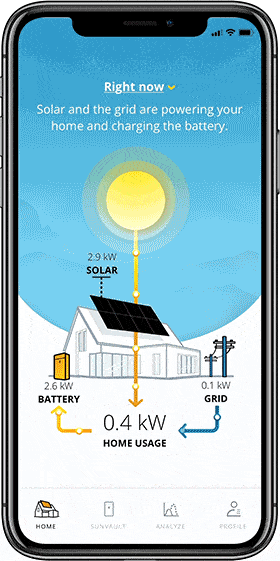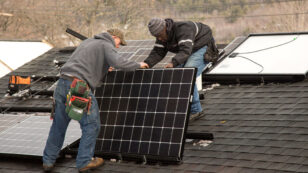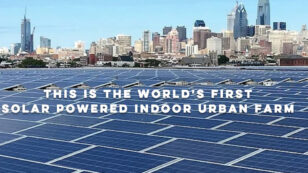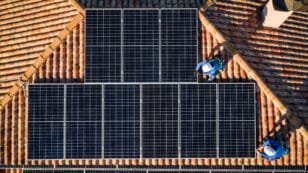 Energy
Energy
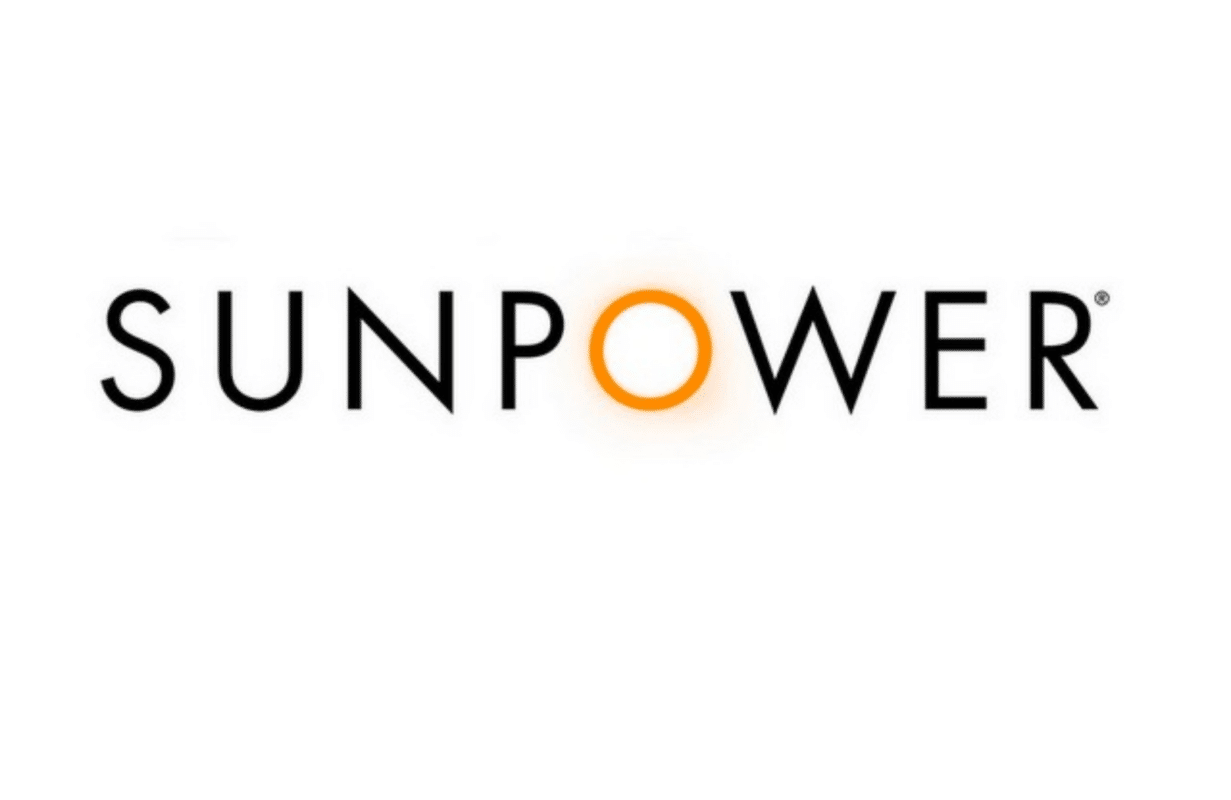
2024 SunPower Solar Review Guide (Costs, Quality, & More)
In this EcoWatch review guide on the solar provider SunPower, you’ll learn:
- Whether SunPower is a legit provider
- How to determine SunPower’s solar panel quality
- What to expect when working with SunPower
- What the average cost of a SunPower solar system is
Each product and or company featured here has been independently selected by the writer. You can learn more about our review methodology here. If you make a purchase using the links included, we may earn commission.
SunPower is one of the largest and oldest solar companies in the country, having been founded in San Jose, California in 1985 and serving all 50 states. Given how widely available it is and its reputation for providing the most efficient solar panels in the industry, it’s no surprise that it shows up as one of the best solar companies. But does the company live up to its reputation?
In this SunPower Solar review, we’ll be taking an in-depth look at SunPower, including its pricing, warranty coverage, customer service, service offerings and more. We’ll explain why we believe it’s one of the best solar installers in the nation, even when considering its drawbacks.
Our Take on SunPower
Overall, we believe SunPower is one of the best solar companies in the nation. Its products and services are on the expensive side, but we feel that the quality and system protection you get are unmatched in the solar industry.
The company delivers systems that outperform and outlast most others, and although customer service can be spotty due to some outsourced installations, we would comfortably recommend SunPower to anyone that can afford to go solar with the provider.

SunPower

Nationwide Service
Average cost
Pros
- Most efficient panels on the market
- National coverage
- Cradle to Cradle sustainability certification
- Great warranty coverage
Cons
- Expensive
- Customer service varies by local dealer
What We Like About SunPower
There are so many positive things we have to say about SunPower, beginning with the company’s experience and longevity.
SunPower was founded in 1985, making it one of the oldest solar companies in the industry. It has time and time again proven that it is here to stay, which means its warranty coverage is also likely to persist for as long as the company says it will — an incredible 40 years for the newer Maxeon panels it installs. Companies with fewer years of experience are more likely to go under and take your warranty coverage with them.
When it comes to the warranty coverage you get, SunPower comes in well above average. Some of its products come with a 40-year comprehensive warranty package that covers the panels and the panel production — with an unheard of 92% efficiency guaranteed after 25 years — plus a workmanship guarantee that lasts for 25 years. The workmanship warranty included is 2.5x the industry average, and the production warranty is nearly double what most other companies offer.
SunPower’s Maxeon line of panels — which are manufactured by the sister company, Maxeon Solar Technologies — are regarded as the best in the industry. Not only do they have an unprecedented warranty to back them up, but they also deliver the highest efficiency available for residential panels — 22.7%. This provides the ultimate peace of mind that your panels will not only maximize your solar savings but also continue saving you money for decades after the installation is completed.
There’s also a lot to be said about SunPower’s availability and accessibility. The company is one of the few in the solar space that services all 50 states, which means all U.S. homeowners should have access to the company.
SunPower also accepts cash payments, solar loans, solar leases and power purchase agreements (PPAs). While not all of these payment options are recommended, it does help ensure that everyone can access clean energy. More on these options later.
What We Don’t Like About SunPower
There are really only two negative things we can say about SunPower. The first is that the company is more expensive than most other providers. The company averages at or above $4.00 per watt for its services, while the national average is $3.33. That means, on the average system size of 9 kilowatts (kW), you can expect to pay around $6,000 more for a system from SunPower than you would for most other installers. However, we do feel the higher investment is justifiable, given the warranty coverage and equipment quality you get.
Second, SunPower does run into some issues with customer service, both because of its size and because it outsources some of its installations to certified third parties. SunPower does have different levels of certification for third-party installers, so you can, to some extent, improve your chances of avoiding slow response times and poor overall customer service. Still, though, this is a downside to consider before moving forward with the company.
We should also mention that SunPower used to manufacture panels and outsource the installations, but now its sister company, Maxeon, handles manufacturing, and SunPower is in the process of taking over installations with an in-house team. This would likely solve many of those potential customer service issues in the future.
Finally, we should note that SunPower only installs its own equipment. Normally, we like to see companies providing a few brands to appeal to customers optimizing different things — like low cost or high efficiency solar cells. However, we consider this a non-issue because SunPower panels are what we consider the best available for home solar arrays.
SunPower Solar Panels
SunPower currently has one line of panels for residential customers: the Maxeon 3 lineup. The Maxeon solar panels are manufactured by its sister company.
These panels have the highest efficiency available for residential solar systems, topping out at 22.7%. That means they will generate more usable electricity for your home than any other panel in all weather conditions, and they’re the most likely to offset or even eliminate your utility bills, especially if you have access to net metering. It also means you can often get away with installing fewer panels, making them ideal for smaller roofs.
Maxeon panels and solar cells not only have an industry-leading efficiency, but they also lose efficiency more slowly and have a better durability than most. The first-year degradation is just 2% — well below the industry average of 2.5% — and the maximum degradation in subsequent years is 0.25%, which is the lowest we’ve seen of any panel.
This efficiency retention means that Maxeon panels will not only outperform other brands in the first year but they will also continue providing higher savings potential and energy production than other options.
Maxeon panels have the lowest temperature coefficient of any major brand as well — 0.25% efficiency loss per degree (C) above 25 degrees (C). That means they are the best options for homeowners in hot climates to maximize their electricity savings.
The Maxeon 3 panels include microinverters from Enphase, which are the most popular in the industry and help maximize the usable energy they generate for your home. These are better than standalone inverters because any issue with the technology doesn’t wipe out your entire system — only a single panel.
Finally, Maxeon panels are all black and don’t have visible grid lines, which most homeowners prefer for aesthetic purposes.
The table below includes some information about both model lines available from SunPower:
| Panel Type | Estimated Cost per Watt (installed) | Cost per Panel (installed) | Power Output | Efficiency Rating | |
| Maxeon 3 (415–430) | Monocrystalline | $4.00 | $1,660–$1,720 | 415W to 430W | Up to 22.7% |
| Maxeon 3 (405–420) | Monocrystalline | $4.00 | $1,620–$1,680 | 405W to 420W | Up to 22.2% |
| Industry Average | Monocrystalline and polycrystalline | $3.33 | $999–$1,498 | 300W to 450W | 15% to 20% |
*Note that cost data is based on cost data from sites like EnergySage, Consumer Affairs, and individual solar installers, as well as cost data from installers pulled from the Tracking the Sun report from the Lawrence Berkeley National Laboratory.
Does SunPower Offer Any Other Solar Products?
In addition to its in-house panel brands, SunPower also offers solar batteries, electric vehicle (EV) chargers and solar monitoring applications. These are helpful for customizing your system and getting the most value out of your solar array as possible. We’ll discuss each of the additional products offered by SunPower in the following sections.
SunPower Solar Batteries
SunPower installs its own solar battery, the SunVault. This is a relatively new solar battery, which was first branded as the Equinox battery system in 2019 and eventually rebranded as the SunVault.
The SunVault is relatively expensive on a per-kilowatt-hour (kWh) basis, but it can quickly pay for itself if you live in an area where you don’t have access to a good net metering policy. Solar batteries like the SunVault can give you access to effective net metering, which means you can store excess solar energy generated during times of high production for use when your consumption overtakes production. It also helps provide power through power outages.
The SunVault has an above-average power output, so you can use it off-grid even if you have high energy demands, and you’re unlikely to run into any issues.
We should take this time to mention that solar batteries have historically been somewhat of a luxury item, especially in areas that have access to net metering. Net metering policies are declining across the country, though, so batteries are becoming more valuable. For example, California recently rolled out net metering 3.0, which drastically reduced the credit rate.
If that trend continues — and we expect that it will — batteries will eventually be all but a necessity to see solar savings. As such, we’re pleased not only that SunPower installs batteries but also manufactures its own.
SunPower EV Chargers
SunPower supplies and installs the WallBox 2 Pulsar EV charger, which is a great way to maximize your savings with your solar system if you own an EV or plan to buy one. The charger fits most EVs available in the U.S. with a Type 1 JAE1772 connector. It can be adapted to fit Tesla charging ports and other models, though.
If you have excess power production from your panels and you own an EV, this charger can give you access to free refueling, which could save you thousands of dollars over the lifespan of your car and solar panel system.
SunPower Solar Monitoring Apps
SunPower has its own solar monitoring mobile app called MySunPower. It syncs wirelessly with your system to let you keep track of solar power production, panel health, energy consumption in your home and more, totally remotely and for free.
Watch Below: See what a recent solar installation looked like by a SunPower-certified New York-based company:
How Much Does SunPower Cost?
SunPower is more expensive than most other solar installers, with per-watt pricing averaging approximately $4.00. For comparison, the average cost of solar equipment in the U.S. is $3.33 per watt. These prices are based on estimates provided by Maxeon installers and customer reports, as well as data from commercial sites and the Lawrence Berkeley National Laboratory. That means that the typical 9 kilowatt (kW) system required in America will cost just over $6,030 more than it would from most other solar companies.
Keep in mind that these numbers are based on national averages, including average per-watt prices for solar equipment and system size requirements based on average monthly energy consumption — which is 881 kWh per month.
Your installation costs can vary quite a lot based on your home size and energy needs, but the average system from SunPower totals around $36,000 before the federal investment tax credit (ITC) or $25,200 after the credit is applied in full. For comparison, the average conversion costs in the U.S. are $29,970 and $20,979, respectively.
SunPower Financing Options
SunPower is quite expensive, but it does keep its products and services widely accessible by accepting a variety of financing options. If you go solar with SunPower, you can pay with cash, with a solar loan through SunPower Financial, with a solar lease or with a power purchase agreement (PPA).
Overall, we would strongly recommend a cash purchase. Buying your system in cash from SunPower is less realistic than from most other installers, given the high cost, but it will lead to immediate panel ownership and yield the highest utility savings over time. Plus, you’ll enjoy the shortest payback period possible.
SunPower’s in-house financing team does have loans with $0-down requirements and low interest rates, so this is a good option if you can’t make a cash purchase work. Still, the interest will extend your panel payback period and reduce your long-term savings by a few thousand dollars.
A lease isn’t generally recommended unless you know you won’t qualify for a loan, and we recommend avoiding PPAs unless you also won’t qualify for a lease. Neither leases nor PPAs let you take the federal credit, and they yield lower savings overall.
Once again, it’s important to consider changes to net metering policies. As those policies decline and batteries become the norm, installation costs are likely to increase by $10,000 to $20,000 because of the need for batteries. That means solar will become less accessible overall, which, in turn, means that having access to multiple financing options like SunPower provides is ideal.
How Can You Save Money with SunPower?
Since the cost of SunPower’s products and services is so high, most customers will look for ways to keep costs down and save in the conversion process. There are a few things you can do that can help save upfront and over time, including the following:
- Take advantage of solar incentives
- Install a SunVault storage solution
- Pay in cash
- Choose more affordable panel options
We’ll explain how each of these money-saving tips can bring costs down in the following sections.
Take Advantage of Solar Incentives
One of the easiest ways to save on your solar panel installation with SunPower is to take all of the solar incentives you can. All U.S. residents currently have access to the federal tax credit, which provides an income tax credit in the amount of 30% of your entire system cost. This credit can be taken over five years.
Since SunPower solar systems are more expensive than most, you stand to save more on a system with SunPower than you would from most other providers. The average ITC value when you go solar with SunPower is around $10,800, whereas the average value from other providers would be $8,991. That’s an additional potential savings of almost $2,000.
Most states will have additional state-level incentives and rebates, and some individual municipalities and electric companies might also have perks available to help you save. You can check the Database of State Incentives for Renewables and Efficiency (DSIRE) for more information on local solar incentives.
In most cases, filing for incentives is a simple and straightforward process that doesn’t take more than a few minutes in each case. However, they can save hundreds or even thousands of dollars.
Consider a SunVault Battery
Another great way to save more and improve your return on investment (ROI) with your SunPower photovoltaic (PV) system is to consider a SunVault battery, particularly if you live in an area that doesn’t give you access to net metering.
Net metering — also called net energy metering or NEM — is a solar perk that lets you bank over-produced energy when the sun is shining and call on that energy when your modules aren’t producing, like at night or on cloudy days. NEM lets you offset your energy bills even when your panels aren’t producing, which leads to maximized savings.
In areas without NEM, we recommend you consider installing a SunVault energy storage system alongside your Maxeon panels. Batteries like the SunVault give you access to effective net metering, allowing you to bank your own energy and call on it for free when you need to offset energy consumption during times of low solar production.
Installing a SunVault will push up your installation costs by between $15,000 and $20,000, according to consumer reports and commercial sites online, but over time, you could stand to save even more than that on electric bills.
It’s important to note that solar batteries are valuable in many states now, but they might become a necessity in the near future. California recently changed to net metering 3.0, which dropped the credit rate for excess energy production. Most states are likely to follow, which means batteries could become necessary for anyone looking to see significant solar savings in the future.
Pay in Cash
Although a SunPower solar system is more expensive than systems from most providers, we suggest you consider paying in cash if you can make it work financially. There are a few reasons for this.
First, you’ll get access to the federal credit, which will be an average potential value of close to $10,500 on a SunPower system. You’d miss out on this potential savings if you chose a lease or PPA. You’ll also enjoy the shortest panel payback period, which means the highest long-term net savings after your system is paid off.
The average solar array in the U.S. pays for itself in just 11 years and then provides additional savings totaling $25,365 on average. If you chose a loan, you’d save about $5,000 less after interest. Leases and PPAs would be expected to save around $20,000 less.
Choose SunPower’s More Affordable Panel Options
Finally, SunPower has two panel lines currently: the SunPower line and the Maxeon line. Both are expensive, but, depending on the installer you get assigned, you might have slightly lower installation costs if you choose the SunPower solar panels.
The Maxeon panels have better performance specifications and are newer, so you could save a few hundred dollars by choosing the sometimes less expensive SunPower model line.
What Should You Expect With SunPower’s Installation Process?
Converting to renewable energy with SunPower is similar to what you’d expect from most other companies. Depending on the third-party installer assigned to your solar project, your experience can vary a little and might include less-than-ideal customer service. For the most part, though, SunPower delivers good service.
We’ll explain what you can expect from SunPower in the following sections.
Step 1: Contact and Company Assignment
Your first step will be reaching out to SunPower. A representative will connect with you and explain the process, including how your installation will be outsourced to a certified third-party installer. This step differs from what you’d expect from most other solar companies, as many complete installations in-house.
There are two types of SunPower installers you could get assigned: a local SunPower Certified Dealer or a SunPower Master Dealer. Certified Dealers are companies that pass a training course and get certified by SunPower to install its systems. A Master Dealer passes a more rigorous training course and testing protocol and is hand-picked by SunPower to represent the brand.
Overall, Master Dealers give you a much better chance of getting quality customer service. However, Master Dealers are only currently available in 21 states, whereas Certified Dealers are available in all 50.
In either case, you should get contact information for your new company, and the SunPower representative will schedule a property inspection to be completed by the subcontractor.
Step 2: Property Assessment
Next, the assigned installation company will show up on the scheduled date to complete the property inspection. They will need to access your roof to check its condition, and they may also need to access your garage space — if you’re installing a SunVault battery — your electric meter, your attic and your water meter.
You will need to be home for the inspection, but it shouldn’t take more than an hour or so to complete. The inspector will also take measurements of your roof.
Step 3: Design and Proposal
The SunPower dealer’s design team will then design a system that will fit on your roof and provide the energy you need to maximize your solar savings. The specifications for the system and the total cost will be included in a formal solar proposal. The rep will likely call to discuss the proposal and answer any questions.
This is another area where you might see differences in the service you get. If you’re assigned a quality Certified Dealer or a Master Dealer, you’re likely to get a call and an in-depth explanation of your system requirements. If not, you might just receive the proposal in your email.
Step 4: Permits and Scheduling
Once you approve the proposal, the installer will begin pulling permits for the installation, after which they will schedule the installation.
Again, your experience can vary a little here among installers. If you get a Master Dealer or a communicative Certified Dealer, then you’re likely to be kept in the loop with how permit applications are going and any delays the team encounters along the way. If not, you might not hear from the installer again until it’s time to schedule the installation.
In either case, you’ll be contacted about the installation date, and your project will be put on the calendar.
Step 5: Installation
On the installation day, your installer should show up in the morning and work through the afternoon. Most systems can be installed in a single day.
You should plan on being home for the entire day, as your techs will need access to your electric meter and any area where you’re having add-on products installed.
Step 6: Inspections, System Activation and Interconnection
Once the system is installed, a representative from your SunPower subcontractor will schedule any inspections needed by your electric company and municipality to close out building permits and get your system connected to the grid.
This process can vary, depending on which installer you get assigned through SunPower. The companies that deliver high-quality customer service should have no delays at this point, while those that aren’t the best with customer care might run into days or even weeks’ worth of delays to get everything in order.
Finally, though, your system will be activated and will start producing energy for your home.
Step 7: Solar Monitoring, Incentives and Warranty Claims
After the installation is another area where your experience will differ depending on the SunPower installer assigned to your project.
If you get a Master Dealer or a reputable Certified Dealer, you’re likely to get walked through setting up the MySunPower app. Your installer should also have no delays in filing for solar incentives for you to help you save on your system. Plus, any issues you have that are covered under warranty should be responded to and resolved quickly.
If you get a less reliable Certified Dealer, your experience may not be as positive. You might be on your own setting up your solar monitoring app, and you could run into delays or a lack of communication and follow up in the incentive-filing phase or if you file a warranty claim.
Does SunPower Offer a Good Solar Warranty?
SunPower provides one of the most robust warranty packages in the entire industry, which means you should have total peace of mind when hiring this provider.
The warranty coverage protects your equipment and guarantees both the power production for 40 years. The labor is also guaranteed for 25 years. The equipment warranty is well above the industry average, but the performance warranty is 20 years longer than most companies offer, and the labor warranty is 4x the industry standard.
The expected lifespan of the SunPower line of panels is between 25 and 35 years, and the expected lifespan of the Maxeon panels is between 40 and 50 years.
The SunVault battery comes with a 10-year warranty, which guarantees that 70% of the starting capacity will remain usable at the end of the warranty term. The term is in line with the industry average, although the remaining life at the end of the term is just slightly below what most other big-name solar batteries guarantee.
Does SunPower Offer Any Other Services?
In addition to solar panel installation, SunPower also offers the following services, which you can use to customize your system and maximize your energy savings:
- Solar battery installation
- EV charger installation
- Solar monitoring services
A decent number of other solar companies also offer all of these services, so there’s nothing that particularly stands out here. However, there are some other national companies — as we discuss in our Blue Raven Solar review — that don’t provide these services.
Ultimately, it’s great to have an installer like SunPower that serves as a one-stop shop for all things related to solar, especially as incentives like net metering decline and make that additional equipment so much more valuable. You only get to take the federal credit once, and you can include batteries and EV chargers in that credit if you get them installed alongside your panels. By offering all of these services, SunPower could help you effectively save around 30% on these add-on products.
Where Is SunPower Available?
SunPower is one of the largest solar installers in the U.S., and it’s currently available in all 50 states. We should note that only Certified Dealers from SunPower install the company’s systems across the country. SunPower Master Dealers are only available in the following states:
- Arizona
- Arkansas
- California
- Colorado
- Connecticut
- Florida
- Hawaii
- Illinois
- Louisiana
- Massachusetts
- Maryland
- Michigan
- North Carolina
- New Jersey
- Nevada
- New York
- Oregon
- South Carolina
- Texas
- Utah
- Virginia
SunPower Customer Reviews
As we’ve mentioned, SunPower receives mostly positive reviews from customers, although the size of the company and the outsourcing of the labor to third parties does lead to some negative reviews. In general, SunPower receives more positive reviews than most national providers, and it even rivals some smaller regional and local companies.
We read through hundreds of SunPower Solar reviews to gauge the overall customer sentiment, which we’ll explain in the following sections.
Positive Reviews of SunPower
Most of the reviews for SunPower are positive, which is great to see. Customers routinely mention how professional their installers are and how courteous and communicative they tend to be throughout the entire process.
A common theme among the positive SunPower reviews is how good the quality and performance of the equipment are. Customers note that power production meets or exceeds their expectations and often leads to immediate energy savings.
Some customers who have filed warranty claims also note how responsive SunPower is and how willing they are to cover just about any issue that might arise.
Overall, customers are satisfied with SunPower and do believe that the quality they get is worth the money in most cases.
Negative Reviews of SunPower
Any company is also going to have its fair share of negative reviews, and a company the size of SunPower is no exception.
The biggest complaint we’ve seen from customers is about customer service, so it’s clear that the service is spotty. Remember, individual reviews often reflect the third-party installer as well as SunPower, so a big part of the experience you have will be based on the installer assigned to your solar project.
Some customers note a lack of communication on the part of the installer, which sometimes includes long delays without any progress being made. Delays have occurred during the permitting process, leading up to installation, during the installation and after the installation in response to warranty claims.
We should note that SunPower has a reputation for addressing warranty claims, but a common issue in some areas is seeing delays in a resolution because of slow response times from the third-party installer. Ultimately, this could cut into your solar savings.
Thankfully, SunPower has fewer negative reviews than most national installers, and the issues are, for the most part, mostly innocuous.
SunPower vs Other Solar Providers
We believe SunPower is one of the best solar providers in the country, so when it comes to comparing it to other companies, we think SunPower comes out on top.
SunPower manufactures the best solar panels available through its sister company, offers industry-leading warranty coverage, accepts a variety of payment options and is one of the only companies to serve all 50 states.
The table below provides a side-by-side look at how SunPower compares to other top providers in the U.S.
| SunPower | Blue Raven Solar (BRS) | ADT Solar | Tesla | Momentum | |
| Year Founded | 1985 | 2014 | 2008 | 2003 | 2009 |
| Areas Served | 50 states | 21 states | 23 states | 50 states | 11 states |
| Better Business Bureau (BBB) Rating | A+ | A+ | A+ | N/A | A+ |
| Services Offered | Solar panel, battery and EV charger installations; solar monitoring | Solar panel and battery installations; solar monitoring | Solar panel and battery installations; solar monitoring | Solar panel, battery, EV charger and solar roofing installations; solar monitoring | Solar panel and battery installations |
| Payment Options | Cash, solar loans, leases and PPAs | Cash and solar loans | Cash, solar loans | Cash, solar loans, leases and PPAs | Cash, solar loans, leases and PPAs |
| Average Price ($-$$$$$) | $$$$ | $$ | $$$ | $$$ | $$$ |
| Overall Star Rating (Click for our review) | 5/5 | 4.5/5 | 4/5 | 4.5/5 | 4.5/5 |
Bottom Line: Will SunPower Work for You?
Overall, we strongly recommend SunPower to most solar customers in the U.S. The company delivers high-quality equipment, above-average energy bill savings per watt installed, a nice array of solar-related services and outstanding warranty coverage.
The only two downsides to working with SunPower are the above-average cost of the equipment — although you get incredible quality for the money — and the sometimes spotty customer service, which is based on the third-party installer assigned to your solar project.
We recommend getting a quote from SunPower no matter what, but you can also use the tool below to get quotes from other companies in your area to compare and see which installer provides the best value.
The cost information presented in this article is derived from a comprehensive analysis, incorporating data from multiple industry sources. The average cost per watt per state was calculated based on figures from Consumer Affairs, Energy Sage, and Berkeley Lab’s Electricity Markets & Policy Department. Additionally, monthly energy consumption and the average monthly cost of electricity were sourced from the U.S. Energy Information Administration, ensuring a well-rounded and accurate representation of the information presented.
Methodology: How We Reviewed SunPower
When researching national companies like SunPower, we look at six different primary criteria that we believe have the biggest influence on your experience and long-term savings. We’ll discuss those factors below and explain how and why we weight them like we do when coming up with an overall company score and assessment.
- Reputation (20%): Solar is becoming more and more popular across the U.S., and with the increase in demand, we’ve seen a lot of companies pop up to take advantage and turn a profit. Unfortunately, some of the newer players in the solar industry cut corners to maximize their profits, and newer companies are more likely to go out of business and void your warranty coverage in the process. SunPower has been serving the industry since 1985 and has maintained a stellar reputation ever since. We feel the company has one of the best and most established reputations in the solar space.
- Cost and financing (20%): Solar equipment is expensive, so we next look at an installer’s average pricing and the quality you get for the money. We also look at payment options offered, as having more options makes a company’s services more widely accessible. SunPower is more expensive than most providers, but it delivers unmatched quality for the price and accepts all four major payment options to appeal to a wider audience.
- Services (20%): A lot of solar customers customize their solar panel systems with EV chargers, batteries — particularly in places with no net metering policy — and other add-on products for improved sustainability. Companies that offer these and other services not only appeal to more customers but also stand to help you save since you can often include those items in the total system cost used to calculate your federal solar credit. SunPower installs batteries and EV chargers, and it also offers its own solar monitoring app for convenience and to help boost savings.
- Installation process (20%): Next, we look at each company’s installation process, including the installer’s propensity for delays, the quality of the installation labor and the overall timeline of and communication throughout the process. SunPower’s installation process can vary a bit among its third-party installers, but for the most part, customers get good and timely service, as well as communicative and respectful technicians.
- Customer experience (10%): We read through dozens and sometimes hundreds of customer reviews for each installer we assess to gauge the overall customer experience and satisfaction. Some customers run into issues with delays at different parts of the installation process with SunPower’s installers, but most are pleased with the quality of the service and equipment they receive. For a national company, SunPower has more positive reviews than average.
- Availability (10%): Finally, we look at each company’s service area and give higher ratings to companies that make their services available in more areas across the country. SunPower is one of the very few installers in the U.S. that serves all 50 states, so it scores very highly in this category.
FAQs: SunPower Solar Reviews
Given the popularity and prevalence of SunPower in the U.S., we get lots of questions about whether or not the installer is worth considering for home solar panel installations. We’ll answer some of the most common questions we see below.
Yes, absolutely. SunPower is one of the largest and most widely trusted solar companies in the entire industry. It has been around since 1985, is credited with numerous solar technology advancements and has completed more installations than most other installers. Plus, the company’s work and equipment are backed by an industry-leading warranty package, so we feel you really can’t go wrong with SunPower.
There are two downsides to working with SunPower, in our opinion. The first is that the customer service can be spotty. SunPower outsources installation to third-party companies, and while they’re certified by SunPower, some provide less-than-ideal service. The second is that its products are relatively expensive. We feel the value you get for the money is second to none, but the equipment is still above-average in price.
SunPower systems average around $3.30 per watt. Given the average system size of 9.5 kW, that’s an average all-in cost of $31,350 or $21,945 after the federal credit. This is around $6,000 higher than you’d see from most other installers, but the quality of the equipment and warranty coverage is outstanding and well worth the added investment, in our opinion.
SunPower’s warranty differs based on the product line you have installed. The SunPower-branded panels (X-series, M-series and U-series panels) come with a 25-year warranty for the equipment, production and labor. This is well above the industry average. The Maxeon-branded panels bump that coverage up to 40 years, which is, by far, the longest coverage available in the industry.
Related articles
Solar Provider Reviews
- Tesla Review
- Sunrun Review
- Momentum Solar Review
- Titan Solar Review
- Sunnova Reviews
- Encor Solar Review
- Semper Solaris Review
- Solar Optimum Review
- Sunbadger Solar Review
- Sun Services Review
- Solanta Review
- Risingsun Solar Review/ Astrawatt
- Tron Solar Review
- Trinity Solar Review
- Sierra Pacific Solar Review
- Seal Solar Review
- Green Home Systems Review
- Palmetto Solar Review
- Nm Solar Group Review
- Ion Solar Review
- Grne Solar Review
- Enlite Home Review
- Suntuity Solar Review
- Elevation Solar Review
- Diablo Solar Review
- Bright Planet Solar Review
- 1st Light Energy Review

 233k
233k  41k
41k  Subscribe
Subscribe 

